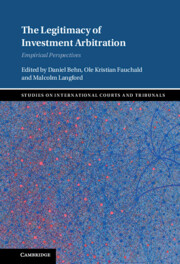Book contents
- The Legitimacy of Investment Arbitration
- Studies on International Courts and Tribunals
- The Legitimacy of Investment Arbitration
- Copyright page
- Contents
- Figures
- Tables
- Contributors
- 1 Introduction: The Legitimacy Crisis and the Empirical Turn
- 2 The International Investment Regime and Its Discontents
- Part I Process Legitimacy
- Part II Process Legitimacy
- Part III Output Legitimacy
- 10 The West and the Rest: Geographic Diversity and the Role of Arbitrator Nationality in Investment Arbitration
- 11 Mixing Methodologies in Empirically Investigating Investment Arbitration and Inbound Foreign Investment
- 12 Double Jeopardy? The Use of Investment Arbitration in Times of Crisis
- 13 Who Has Benefited Financially from Investment Treaty Arbitration? An Evaluation of the Size and Wealth of Claimants
- 14 Explaining China’s Relative Absence from Investment Treaty Arbitration
- Part IV Legitimation Strategies
- Index
12 - Double Jeopardy? The Use of Investment Arbitration in Times of Crisis
from Part III - Output Legitimacy
Published online by Cambridge University Press: 06 January 2022
- The Legitimacy of Investment Arbitration
- Studies on International Courts and Tribunals
- The Legitimacy of Investment Arbitration
- Copyright page
- Contents
- Figures
- Tables
- Contributors
- 1 Introduction: The Legitimacy Crisis and the Empirical Turn
- 2 The International Investment Regime and Its Discontents
- Part I Process Legitimacy
- Part II Process Legitimacy
- Part III Output Legitimacy
- 10 The West and the Rest: Geographic Diversity and the Role of Arbitrator Nationality in Investment Arbitration
- 11 Mixing Methodologies in Empirically Investigating Investment Arbitration and Inbound Foreign Investment
- 12 Double Jeopardy? The Use of Investment Arbitration in Times of Crisis
- 13 Who Has Benefited Financially from Investment Treaty Arbitration? An Evaluation of the Size and Wealth of Claimants
- 14 Explaining China’s Relative Absence from Investment Treaty Arbitration
- Part IV Legitimation Strategies
- Index
Summary
It is often claimed that investment arbitration is used as a means of last resort that occurs as a response to the realization of two types of shock towards foreign investors – one from severely dysfunctional governance at the national level and the other from an economic crisis. With an original dataset that includes investment claims filed under the rules of all arbitration institutions as well as ad hoc arbitrations, the authors test links between governance, economic crises and investment arbitration. They find that poor governance, understood as corruption and lack of rule of law, has a statistically significant relation with investment arbitration claims, but economic crises do not when considered separately. Yet, bad governance and economic crises considered together are a good predictor of when countries will get hit by investment arbitration claims. Their findings are of great significance to important questions regarding outcome legitimacy, in particular whether ISDS produces legitimate outcomes if used to redress or mitigate severe governance deficiencies, and whether its use in the context of economic crises hurts countries in great difficulty and thereby undermines efforts to arrive at mutually satisfactory solutions.
Keywords
- Type
- Chapter
- Information
- The Legitimacy of Investment ArbitrationEmpirical Perspectives, pp. 365 - 393Publisher: Cambridge University PressPrint publication year: 2022
- 1
- Cited by

